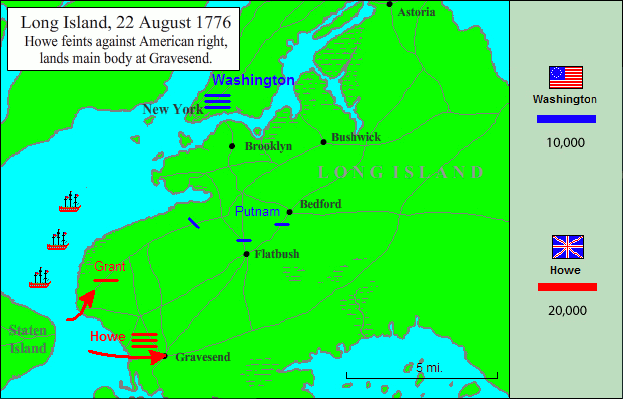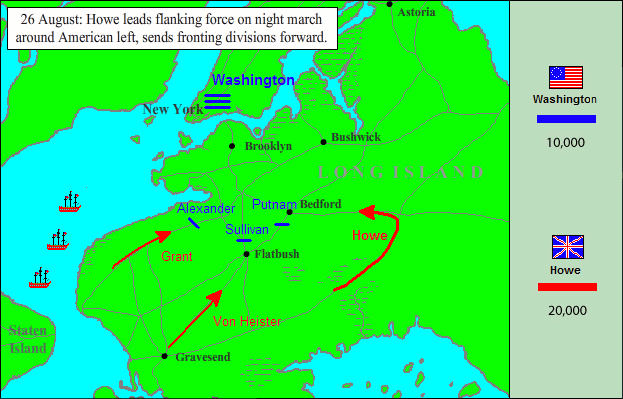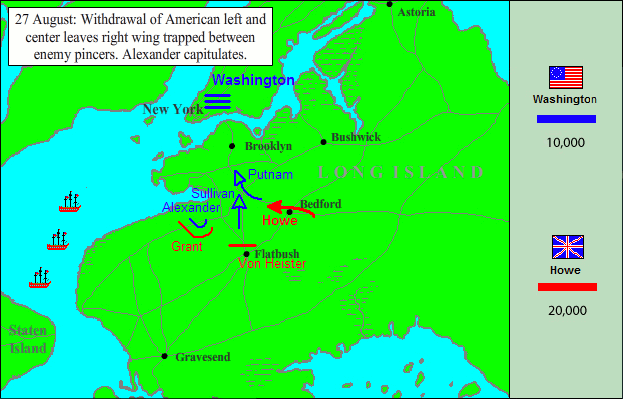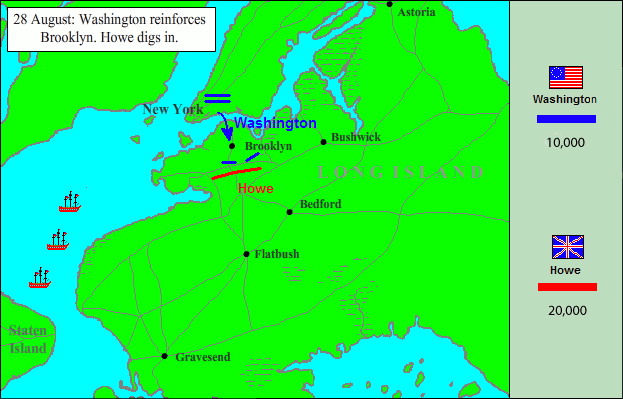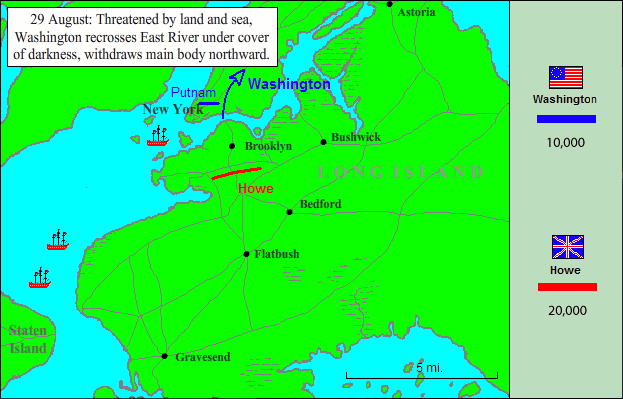Long Island
Good God, what brave fellows I must this day lose!
–George Washington
The exact nature and full extent of General Washington’s New York problem in midsummer of 1776 were as clear as daylight. Anyone who looked to the harbor could see, as one New Yorker described, “something resembling a wood of pine trees trimmed… the whole Bay was as full of shipping as ever it could be. I… thought all London was afloat.” Admiral Richard, Lord Howe, and his warships were gathering off Staten Island to help Sir William Howe’s army seize New York from Washington’s control. General Charles Lee was perfectly sensible if not particularly helpful when he wrote to Washington: “What to do with this city, I own it puzzles me. It is so encircled with deep navigable water, that whoever commands the sea must command the town.” With the harbor on Washington’s front, the Hudson River on his right flank, and the East River on his left, only ill winds or bad weather could keep the British from striking wherever and whenever they chose. It may be that in the end the defense of New York was simply not possible. Outnumbered on land and overwhelmed on the water, Washington might have prudently fallen back on Westchester or even farther north on the Hudson highlands for a chance to fight on more promising ground. But at this point in the struggle, the general was unwilling to surrender the island without giving battle. To that end, he divided his army into five divisions: three he posted on Manhattan’s southern tip, one on the northern end of the island at Fort Washington, and the fifth across the East River on Brooklyn Heights. Just as Dorchester Heights commanded Boston, the high ground on Long Island would be the key to the defense of New York. Throughout the summer Washington kept his men sweating away with the pick and the spade, and strong works rose up out of New York’s stony soil. Still, it was a dangerous division of his army’s strength: his lines encircled more ground than he had manpower to hold, and the Howe brothers were perfectly capable of striking at any isolated part.
As Washington’s men dug deeper, the British power that opposed them grew stronger. In addition to William Howe’s command down from Halifax, Sir Henry Clinton was under sail with eight full regiments after their bruising failure to seize Charleston, South Carolina. Admiral Howe’s fleet likewise carried heavy reinforcement from England. Among them was a new element in the contest: the German mercenaries, 8,000 initially and some 30,000 before the war was over. Their very presence was an early sign of reluctance on the part of the British people to prosecute this war against their American cousins. When recruiting efforts on the home front came to little, King George had turned first to Catherine the Great of Russia to hire twenty thousand troops. Failing there, he found willing merchants among the three hundred German princes who had been in the business for nearly a century now. The Duke of Brunswick, for example, supplied 4,300 troops for the British cause for a little more than 11,000 pounds sterling. It was a precisely brutal business: a dead man earned the duke an additional seven pounds, four shillings, and fourpence, and three wounded were reckoned as one dead. Because something like half of the German troops were pawns of the Landgrave of Hesse-Cassel, these unfortunates came to be known collectively as Hessians in America. Of the 30,000 who served, only 17,000 ever saw their native land again. Perhaps the luckiest were the 5,000 who deserted a cause that was never theirs in the first place. For these, being sold like cattle proved to be the first step toward freedom and dignity. It would be interesting to know how many living Americans can trace their descent to desperate soldiers who had the nerve to throw down their muskets and begin a new life in a new land.
For the time being, though, the Germans were simply pleased to be released from the stinking holds of British transports. A bloody battle might be about to blow up, but at least they had an opportunity to breathe the fresh air of Staten Island and eat something more satisfying and sustaining than rancid salt horse and weevily biscuit. And a battle was brewing. This one, however, would begin with a peace offensive. Admiral Howe was a highly capable and combative seaman–and his men used to say that when Black Dick smiled, battle was at hand. But, like his brother William, his heart was not fully committed to this American war. He had conferred with Benjamin Franklin in London back when peace was still a possibility, and while blood had now been shed on both sides, he continued to believe that reconciliation was to be preferred to conquest. As the price of his willingness to serve in America, he received from Lord George Germain a curious peace commission. The actual powers therein, granted to both him and his brother, were limited: they could grant pardons to Americans when (and if) the Rebels submitted to royal authority. In July Admiral Howe sent a young lieutenant through the lines to New York, bearing a letter addressed “To George Washington Esquire,” an address that pointed to a perfectly proper refusal to recognize Washington as the commanding general of the army of a foreign nation. The letter was promptly refused by Washington’s adjutant Joseph Reed on the grounds that “We have no such person here in our army with that address.” Back the letter went to Howe and back it came addressed to “George Washington Esq., &ca, &ca,” this time carried by the adjutant general of the British Army, Lieutenant Colonel James Patterson. After more polite but unsatisfactory hemming and hawing about Washington’s proper rank, Patterson finally asked if “General Washington” would be willing to discuss peace with Lord Howe. Having at last got to the point of the peace commission, Howe had nothing whatever to show for this punctilious dance. Refusing to meet with Howe, Washington was forthright now: first, he had no power from the Continental Congress to treat for peace, and second, he recognized that the Howes had no proper power from their government to do so either. The Howes could only grant pardons, and the Americans, believing in the justice of their cause, “wanted no pardons.” Not much of a gambit to begin with, Howe’s well-intentioned effort produced only a minor propaganda victory for the American cause. Back in Philadelphia, Dr. Franklin wondered openly and icily how the admiral, whom he liked and respected, could have been so speciously used by his government “in so fruitless a business.” Americans were not to be deceived into submission by Lord Howe’s flimsy instrument. Thus, back to the maps went the Howes to plot out the use of their truly formidable instrument: the British army and the royal navy, with which they intended to drive Washington from New York and seize control of the Hudson River. With the Hudson in British hands, Sir Guy Carleton would then be able to march south from Canada, completing the isolation of New England, which the British believed to be the heart of the rebellion. With New England and New York effectively out of the struggle, there was good reason to think that the war effort in the mid-Atlantic and southern colonies would soon collapse. If all went well, there might be real peace, on British terms, before the year was out.
It was the third week of August before the Howes were ready to move, but when they did, they did so with brisk efficiency. Early on 22 August red-coated Britons and blue-coated Germans clambered aboard some eighty flat-bottomed transports on Staten Island and began pulling for Gravesend Bay on Long Island’s south shore. Under the guns of Lord Howe’s frigates and bomb ketches, they landed virtually without opposition. By midday 15,000 Regulars had pushed inland as far as Flatbush and were fanning out along a six-mile arc opposite the American positions. There were actually two lines of American defense. The first line was two miles from Brooklyn village, nearly to Flatbush, and ran along the crest of the Heights of Guan. This steeply pitched and heavily wooded ground was pierced by four important passes: from west to east, Gowanus Road, Flatbush Road, Bedford Pass, and Jamaica Pass beyond the American left. Washington’s plans for its defense were fairly straightforward: William Alexander, a New Jersey brigadier, would hold the American right opposite Gowanus Road and closest to Gowanus Bay; Major General John Sullivan held the American center opposite Flatbush, and Colonel Samuel Miles of Pennsylvania held the American left. The second line of American defense was on Brooklyn Heights proper, a sturdy line studded with eight forts and supported by nearly thirty guns; it faced southeast with its back to the East River shore. In overall command on Long Island was Israel Putnam, a last-minute replacement for Nathanael Greene, who was down with some kind of vicious camp fever. Indeed, Greene’s fever would be an unfortunate twist of fate for the American cause. No one doubted Putnam’s combative spirit and Washington had committed ten thousand of his best troops to Long Island, but Putnam did not know the men in his command and, more importantly, had hardly seen the ground he was to defend before the battle blew up in his face.
In fact, William Howe’s camp, thanks to the counsel of Queens County Loyalists, knew the Heights of Guan better than the Americans, and especially the ground on the far left of the American line in the direction of Jamaica Pass–which ground, as it happens, was virtually undefended. Howe, who had seen his army mangled on the slopes of Breed’s Hill, had no intention of driving the Americans from the Heights by brute force and made his dispositions accordingly. Major General Grant’s Regulars were to demonstrate against the American right while the Hessians under General Philip von Heister would hold the American center opposite Flatbush. The business end of the battle would be carried by a column marching well around the American left and smashing down on the enemy lines from behind. By nine o’clock on the night of 26 August Howe’s plan was in motion: Sir Henry Clinton lead a column of dragoons and light infantry down the dark roads that ran eastward to Jamaica Pass; immediately behind them marched Lord Charles Cornwallis with the grenadiers, two regiments of foot, and the field artillery; bringing up the rear was the redoubtable Lord Percy with the rest of the striking force. By three o’clock the next morning the attackers reached the pass and scooped up five hapless American horsemen, all that stood between them and Bedford Village in the American rear. It was nearing dawn as they marched quickly and quietly westward now down the Jamaica Road. Their silence was broken by the distant rattle of musketry and the muffled booming of field guns from Grant’s command holding the American right and von Heister’s Germans opposite Flatbush on the center. The first sign of the looming disaster was actually right in front of Colonel Miles on the left. His men had been skirmishing for several days now, but in the twilight of dawn on the 27th it was becoming increasingly clear that the bulk of Howe’s men were no longer on his front. Indeed, by nine o’clock they were almost directly in his rear at the crossroads village of Bedford, from which location the barking of two signal guns told William Howe that his well-laid trap was about to be sprung.
Sir Henry Clinton’s light infantry would do the springing, driving into the American rear with a disciplined surge and smashing most of Miles’ and Sullivan’s commands into terrified fragments at the first shock. Prepared to grapple with an enemy on their front, it must have seemed to the Americans that every redcoat in the world was now between them and their comrades on Brooklyn Heights. Some surrendered, overwhelmed in the first wave, others raced for Brooklyn through the wooded countryside, but the plain fact was that anything like organized resistance on the left collapsed in less than an hour. Meanwhile, in accordance with Howe’s crisply coordinated plan, Grant’s redcoats came smashing up the Gowanus Road to push Alexander’s command off the high ground while von Heister’s jagers and grenadiers drove through Flatbush Pass to attack Sullivan. On the Hessian front, the fighting was especially savage. The German troops had been told truthfully that the Americans bore particular malice for mercenaries but falsely that they would give no quarter to them. The brutal result was that many desperate Continentals were bayonetted to death as they tried to surrender. It was an ugly business that shocked even the British Regulars, who were not easy to shock. Only on the right were the Americans putting up a fight but this was a spirited one. Grant had once boasted that he could march the length of colonial America with five thousand Regulars. He was discovering now that simply driving Alexander’s men from the Gowanus Road would be a formidable undertaking. Here Alexander (known to Americans as Lord Stirling for his claim to a lapsed Scottish title) was handling his regiments with determined skill. One of the attackers remembered a Delaware regiment in particular with “their ranks full, their uniforms smart… and their courage high.” For a time they maintained a stiff stand-up fight and gave as good as they got.
But with the collapse of the American center and left, Alexander’s men were quickly becoming an island in a surging sea of British and Hessian infantry. One last perilous passage to Brooklyn Heights remained: broad, marshy Gowanus Creek on the far right. Whether this tidal creek would be a safe passage or another killing ground depended on stopping the British advance at least long enough to give the bulk of the troops a chance to cross the marsh. Alexander detached some 250 Maryland men under Mordecai Gist and lead them at the point of his sword into the onrushing redcoats. The first attack was blunted by musketry and cannon fire, but–incredibly–they reformed and made five more determined but doomed attacks. Washington, watching the disaster unfold from Brooklyn Heights, cried out, “Good God, what brave fellows I must this day lose!” And the loss here was very nearly complete: only eight of the Maryland men ever reached Brooklyn. Alexander himself was taken prisoner, surrendering his sword to von Heister, about the same time that General Sullivan was likewise seized by Germans in a nearby cornfield. If there was any solace besides the sheer gallantry of Alexander’s resistance, it was that a body of Americans, in numbers yet unknown, had reached the works on Brooklyn Heights. One of these was a sixteen-year-old Connecticut lad, Joseph Plumb Martin, who with many of his comrades slogged out of the mire of Gowanus Creek “looking like water rats, a truly pitiful sight.”
And it could hardly have looked more pitiful for the American cause by noon of the 27th: though the Brooklyn works themselves were generally strong, they were manned by the fragments of Washington’s broken Long Island command, demoralized, disorganized, many disarmed. It would take time to reckon the loss, but of the 10,000 committed to the battle, nearly 1,500 were killed, wounded, or captured at a cost to the British of less than 400. Most critical to the very survival of the American command was the fatal Jamaica Road, a vulnerable approach to the Heights and still virtually undefended, though a New York outfit was even then digging in there with sweaty desperation. If Fort Putnam on the American left could be taken or flanked, the entire Long Island command, with nothing at their backs but the East River and the British fleet, would be gobbled up. It would mean the loss of fully half of the American army, and this the best trained and best-equipped half. Indeed, it might mean the end of the rebellion then and there. This was precisely what Sir Henry Clinton, who had led the smashing flanking column, now hotly urged on Sir William Howe. Washington had been outgeneraled and his men outfought. One British officer swore his grenadiers could take Fort Putnam in five minutes and inside of an hour drive the whole milling mob of Rebels to the Brooklyn Ferry. But deliverance for the Americans, at least for the time being, was at hand in the persons of the two most important men on the battlefield. The first was Sir William Howe, who, having crisply won half a battle, was now willing to settle into a siege of Brooklyn Heights by “regular approaches.” To the undisguised disgust of many of his subordinates, he would follow, as he later wrote, “the dictates of prudence rather than those of vigor.” The second savior was General George Washington. It may be that inwardly he was as shaken as his men by the disaster, but outwardly he was an imperturbable and active presence. What he would do tomorrow he did not know, but on this dismal night he would hold this ground. With a brace of pistols in his hands, he vowed to shoot the first man who ran.
No man doubted Washington’s courage or resolve, but it would certainly be fair to question his judgment at this point. Still convinced that the Heights could be held, he ferried three additional regiments from Manhattan to Brooklyn the next morning. It was a move that violated a perfectly sound military principle: never reinforce failure. If General Howe were to move aggressively against the Heights while Admiral Howe brought his frigates into the East River basin, Washington would have simply added three regiments to the toll of the captured. But it was Washington’s good fortune just then to see the Howes violate a perfectly sensible military principle themselves: never surrender the initiative, or, as hard-driving Nathan Bedford Forrest would put it a century later, always “keep up the scare.” It is difficult to understand or explain the strange inertia of the Howes. Both had well-earned reputations for aggressive, decisive leadership. Some have blamed unfavorable winds for Admiral Howe’s failure to block the East River, though the sailors under him at the time did not think so. As for General Howe, it may be, as many have argued, that Howe was never quite the same after the slaughter on Breed’s Hill. Certainly, it was sound judgment to husband his manpower carefully. As Lord Percy wrote that summer, “Our army is so small that we cannot even afford a victory.” It is also possible that both leaders feared that an aggressive war of conquest would make of America another Ireland–not a productive partner in empire, but a seat of endless and insoluble enmity. Perhaps in the end the Howes’ hearts were simply not in this fight. In any case, right before them was a rare and remarkable opportunity–a decisive victory to be had at bargain prices. The day after the battle a sullen rain fell, and the Americans shivered in their sodden trenches, trying to keep their powder dry and their spirits up. But the bombardment by sea and bayonet attack by land that all dreaded never came: Admiral Howe’s warships stood patiently at anchor in the harbor while General Howe’s sappers dug regular approaches to Fort Putnam. The Howes’ inertia was a gift beyond reckoning. Washington, always sensitive to slights of his reputation, could barely bring himself to contemplate retreat on top of defeat. He seemed for a time prepared to lose his army to save his reputation. But by the morning of 29 August, he was willing to listen to good counsel and retreat to Manhattan–if the British would let him.
Now Washington called for every boat “from Hellgate on the Sound to Spuyten Duyvil Creek that could be kept afloat and had either sails or oars.” While he gathered what could be gathered, he would have to pull his army out of line, regiment by regiment, in absolute silence and secrecy and retreat to Manhattan. Even the Howes would not fail to seize the opportunity of smashing a beaten enemy as it attempted to disengage and cross a mile of open water. But it may be as Washington believed: a benevolent providence was at work in the affairs of men. One instrument of that providence was in the northeast wind that now kept British warships in the harbor and out of the East River. A second was in the very capable hands and strong backs of the seamen in Washington’s army. As providence would have it, the reinforcement sent to Long Island included John Glover’s Marblehead outfit and Israel Hutchinson’s 27th Massachusetts recruited out of Salem–fishermen and sailors all. In a dreadful hush, the boats were loaded at Brooklyn Ferry and the Marblehead and Salem men rowed with a right good will across to Manhattan, a two-mile haul back and forth. As oarsmen say, they moved a lot of water that dark night–and took a beaten army to safety. In the late hours the wind shifted to the southwest, providing an opportunity for the British fleet to wreak havoc, but with the wind came a thick cloak of concealing fog. Some six hours later virtually the whole of Washington’s Long Island command was on the Manhattan shore, nine thousand men and all their gear but a few rusted cannon. Washington himself stepped into one of the last of John Glover’s boats to join his men. It had been a magnificent, indeed a miraculous night’s work. As one Briton wrote, “Those who are best acquainted with the difficulty, embarrassment, noise and tumult which attend even by day, and with no enemy at hand, a movement of this nature… will be the first to acknowledge that this retreat should hold a high place among military transactions.”
A skillful retreat had kept Washington’s army alive, and that would have to pass for an American victory for the time being. As for General Howe, having seen opportunity come and go at least three times, he was in no particular hurry to press the fight on Manhattan. He even conferred with the captured American generals, William Alexander and the luckless John Sullivan, and tried to persuade them to join a new peace initiative. Alexander, a tough-minded Scot who nourished an abiding mistrust for the British, would have none of it. Sullivan, though, was given a pass to Philadelphia to put Howe’s peace proposal before Congress. All he achieved there was to persuade some that he was both an incompetent on the battlefield and a fool in counsel. John Adams expressed the wish that the first musket ball fired on Long Island had gone through John Sullivan’s head.

